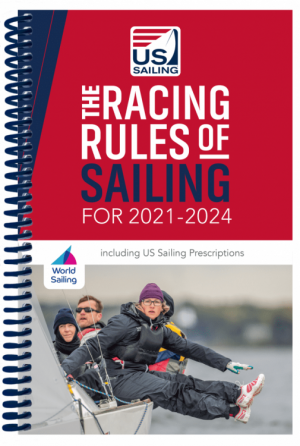Sailing Clean and Fair May Involve a Protest on the Race Course
Sailboat racing is a unique sport for many reasons, including that in most regattas our fellow competitors are our “on-the-field” referees. Yes, deeper dives into incidents can take place through the arbitration, protest, and/or appeals processes. And some regattas do have on-the-water umpires to monitor actions and enact penalties. But for the most part, the initial “hey, you did something wrong” comes from another competitor.
 It may be a fine line between using the rules to your advantage on the racecourse and breaking a rule, but there’s still a line. Whether it’s a Racing Rules of Sailing Part 2 “When Boats Meet” incident, or a perception that a competitor has gone beyond what is allowed in Rule 42 (Propulsion), it’s on us as sailors to holler out.
It may be a fine line between using the rules to your advantage on the racecourse and breaking a rule, but there’s still a line. Whether it’s a Racing Rules of Sailing Part 2 “When Boats Meet” incident, or a perception that a competitor has gone beyond what is allowed in Rule 42 (Propulsion), it’s on us as sailors to holler out.
The Corinthian ethic of doing your penalty turn(s) if you have violated a rule has been instilled in most (but unfortunately not all) sailors thanks to good coaching and watching the examples set by those who sail with integrity. You did wrong? You spin. How dizzy you get depends on what you did and where you did it, but it’s an easy way to accept responsibility and avoid the protest room.
Of course, if you feel you were not “in the wrong,” you can let it play out in the protest room. And you can counter protest if you think the other competitor actually fouled you.
While none of this is very fun, it is crucial to the success of sailing as a sport. One aspect of the shared responsibility for sailing fairly that gets less attention than it deserves is the importance of calling out bad behavior and, indeed, protesting when you have been fouled. Hailing “protest” does not mean that you are a whiner. It simply means that from your perspective, you feel your competitor broke a rule.
Ensuring that rules are followed, and that sailors who do not follow the rules learn that they have broken rules so that they do not do so the next time, makes sailing a more consistent and, dare I say, welcoming sport. A fleet where sailors respect each other and the Racing Rules of Sailing is one I want to be part of.
Some fleets get reputations as being a fleet where there’s chaos; where the rule-breakers run roughshod. We have all heard those fleets—lots of yelling at mark roundings, even the occasional “protest”—but nobody spinning circles. Those fleets get bad reputations and eventually lose participation and fade away. It can take years for fleets to rebuild their reputation for being a place where sailors respect one another and follow the rules.
Breaking the rules and trying to get away with it is not what sailboat racing is about. It’s about getting a clean start and sailing fast and making good tactical and strategic decisions. If you’re a good sailor, breaking rules and laughing about it, or whining when you get protested, detracts from your skill set. If you’re still working on building your sailing skills, breaking rules won’t make you any faster, but will make you lose the respect of your fellow sailors.
I think most sailors are like me: We can sometimes remember who won a regatta we sailed in five or 10 years ago and can’t really remember how we placed at a regatta a few years back, but we can definitely remember who sailed like jerks.
So, how’s about this for a New Year’s Resolution: Don’t sail like a jerk! In all seriousness, sailing clean and fair is good not only for your reputation, but for our sport in general. Help your fleet be a happy fleet by sailing clean and by supporting the protest process when it’s needed.
Find the Racing Rules of Sailing here.
About the Author: SpinSheet Small Boat columnist for more than a dozen years, Kim Couranz has earned several national and world titles in Laser Radials (ILCA 6) and Snipes. She has also raced J/22s, J/24s, and Ynglings on an international level.




